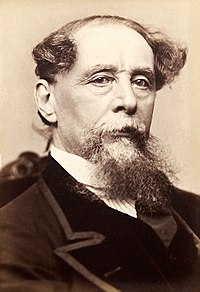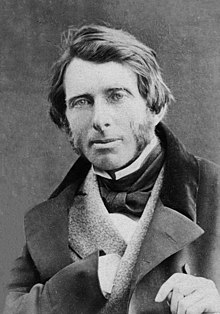
19th-century British journalists
During the 19th century, London grew enormously to become a global city of immense importance. It was the largest city in the world from about 1825, the world's largest port, and the heart of international finance and trade.
2 episodes
Episodes in this category also belong to the following categories:
English male poetsWriters about activism and social changeCritics of the Catholic ChurchEnglish essayistsEnglish male non-fiction writersBurials at Westminster AbbeyBritish male essayistsEnglish AnglicansEnglish male dramatists and playwrightsEnglish male novelistsEnglish people of Scottish descent19th-century English poetsCritics of work and the work ethicEnglish male short story writersLiteracy and society theoristsVictorian novelists19th-century English novelists19th-century pseudonymous writersAnti-consumeristsEnglish satiristsEnglish travel writers19th-century English non-fiction writersAnglican writersBritish critics of religionsMale essayistsTrope theoristsWriters of Gothic fiction19th-century British philanthropists19th-century British short story writersEnglish fantasy writersEnglish philanthropistsEnglish philosophers19th-century British economists19th-century English dramatists and playwrights19th-century English essayists19th-century travel writersAlumni of Christ Church, OxfordArtists' Rifles soldiersBritish social reformersEnglish historical novelistsLecturersWriters from the London Borough of Camden19th-century English historiansAlumni of King's College LondonAnglo-ScotsArchitectural theoreticiansArts and Crafts movement artistsCritics of political economyEnglish children's writersEnglish prisoners and detaineesEnglish reformersPeople from Somers Town, London
Dickens
Melvyn Bragg discusses the achievements of Charles Dickens What is his political and literary legacy to our age?
12 July 2001
Featuring: Rosemary Ashton, Michael Slater, John Bowen
English travel writersEnglish prisoners and detaineesEnglish male dramatists and playwrightsEnglish AnglicansLiteracy and society theoristsAnglican writersEnglish male short story writersWriters of Gothic fictionEnglish philanthropistsEnglish historical novelistsTrope theoristsBurials at Westminster AbbeyVictorian novelists19th-century English novelists19th-century travel writers19th-century English non-fiction writers19th-century British journalists19th-century English historians19th-century British philanthropistsEnglish male novelistsBritish critics of religionsCritics of the Catholic ChurchPeople from Somers Town, LondonEnglish male poets19th-century pseudonymous writersLecturersEnglish reformers19th-century English dramatists and playwrights19th-century English poets19th-century British short story writersEnglish satiristsWriters about activism and social changeEnglish male non-fiction writersWriters from the London Borough of Camden19th-century English essayistsBritish social reformersBritish male essayistsJohn Ruskin
Melvyn Bragg discusses the life and work of John Ruskin, art and social critic, and one of the most influential figures of the Victorian era.
31 March 2005
Featuring: Dinah Birch, Keith Hanley, Stefan Collini
Alumni of Christ Church, OxfordEnglish children's writersEnglish philosophersArtists' Rifles soldiers19th-century British economistsCritics of political economyEnglish essayistsCritics of work and the work ethicEnglish fantasy writersArts and Crafts movement artistsArchitectural theoreticiansMale essayistsAlumni of King's College LondonAnti-consumeristsAnglo-ScotsEnglish people of Scottish descent19th-century British journalists

